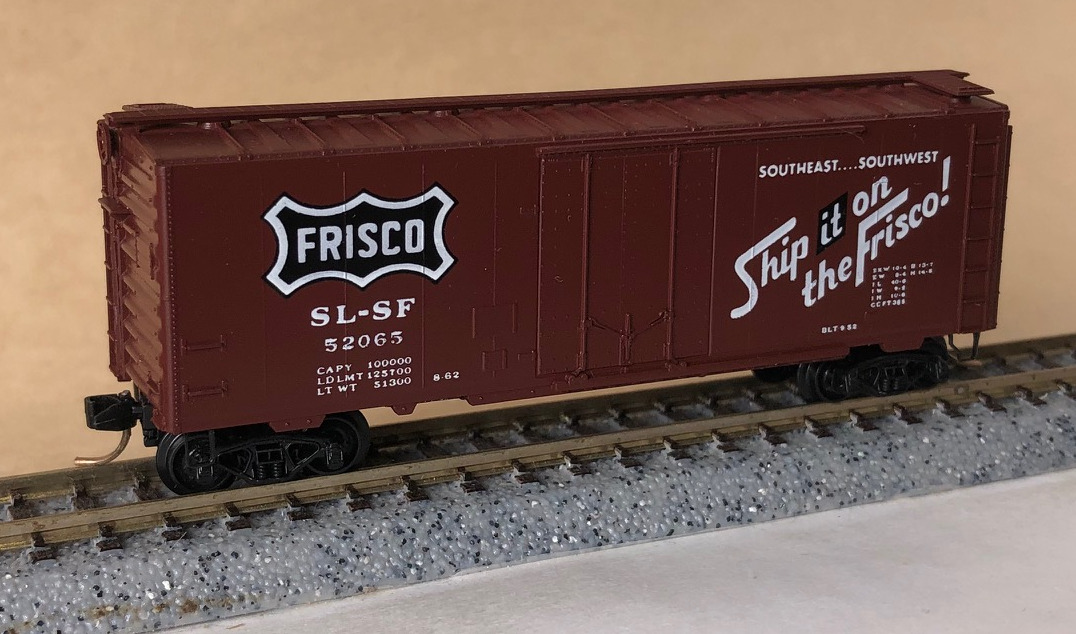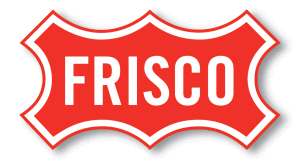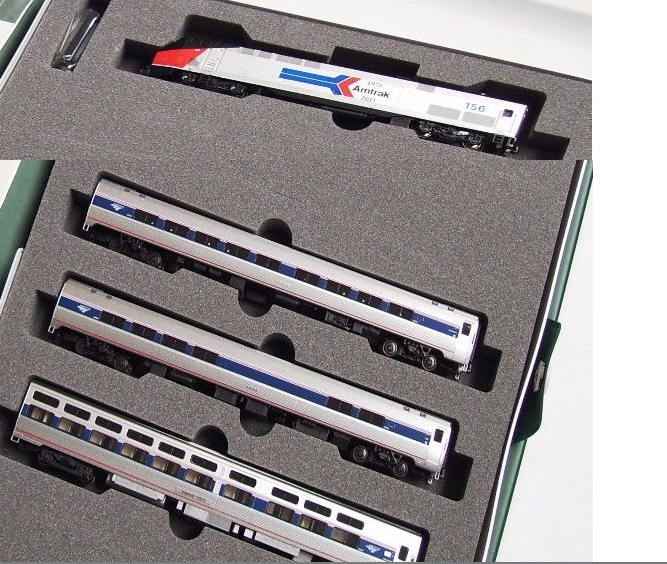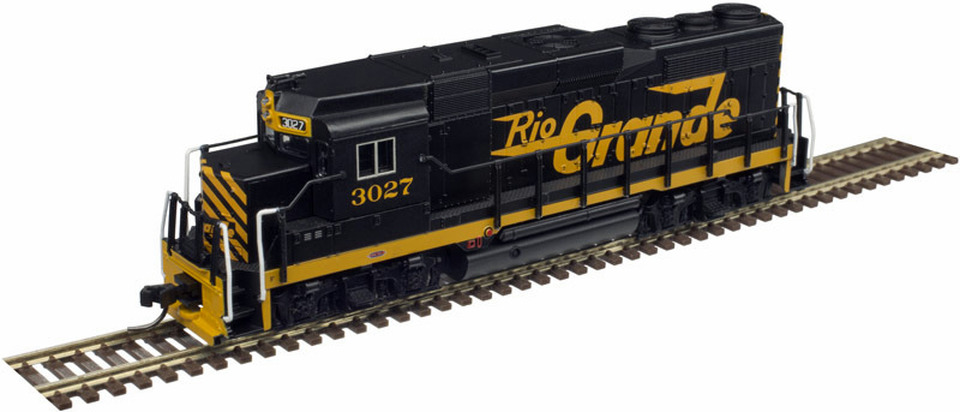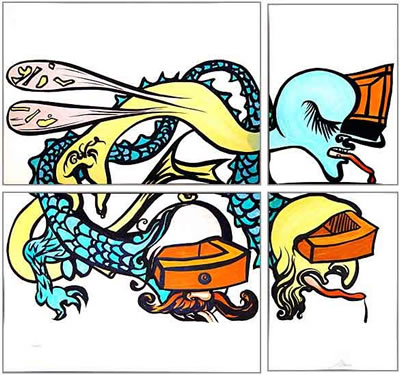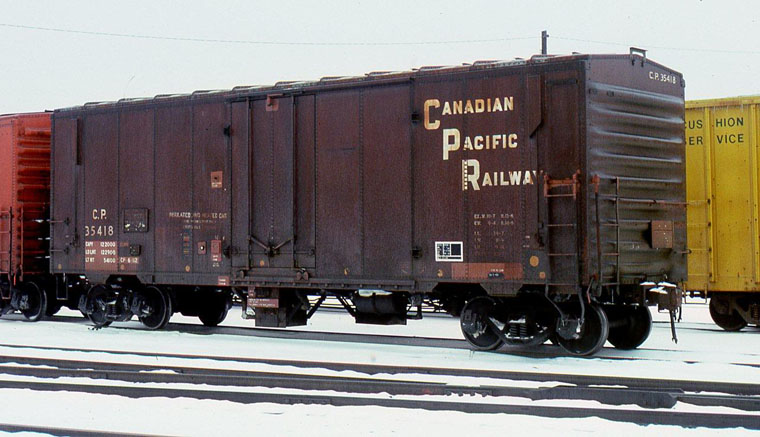Micro-Trains - 14911 - Boxcar, 40 Foot, Steel Plug Door - Frisco - 52065
| Brand | Micro-Trains |
| Stock Number | 14911 |
| Secondary Stock Number | 502 00 110 |
| Alternate Stock Number | 14911.2 |
| Original Retail Price | $14.10 |
| Manufacturer | Micro-Trains |
| Body Style | Micro-Trains Boxcar 40 Foot Plug Door |
| Prototype Vehicle | Boxcar, 40 Foot, Steel Plug Door (Details) |
| Road or Company Name | Frisco (Details) |
| Reporting Marks | SLSF |
| Road or Reporting Number | 52065 |
| Paint Color(s) | Boxcar Red |
| Print Color(s) | White |
| Coupler Type | Micro-Trains |
| Coupler Mount | Truck-Mount |
| Wheel Type | Injection Molded Plastic |
| Release Date | 1989-06-01 |
| Item Category | Rolling Stock (Freight) |
| Model Type | Boxcar |
| Model Subtype | 40 Foot |
| Model Variety | Steel, Plug Door |
| Region | North America |
| Prototype Era | NA Era III: Transition (1939 - 1957) |
Prototype History:
Plug-Door boxcars are usually insulated and typically carry products such as canned goods that require protection from extremes of temperature but do not require refrigeration. Plug-style doors were normally used to ensure a tight seal in the insulation. Designed for transport of both perishables and large loads, plug doors allowed box cars to be sealed from outside dust and dirt. Cars like these were manufactured during the 50s and 60s.
Whether you consider this a reefer or a boxcar is a matter for angel-pinhead-counters. There seems to be a bit of a blurry line during the transition era between the idea of a steel ice reefer and an insulated boxcar. I guess an ice reefer was meant to hold ice for cooling but I doubt this is a cut-and-dry distinction. Modern "mechanical" reefers are a different breed as they contain a refrigeration unit which quite distinctly sets them apart from "boxcars".
Whether you consider this a reefer or a boxcar is a matter for angel-pinhead-counters. There seems to be a bit of a blurry line during the transition era between the idea of a steel ice reefer and an insulated boxcar. I guess an ice reefer was meant to hold ice for cooling but I doubt this is a cut-and-dry distinction. Modern "mechanical" reefers are a different breed as they contain a refrigeration unit which quite distinctly sets them apart from "boxcars".
Road Name History:
The St. Louis - San Francisco Railway (reporting mark SLSF), also known as the Frisco, was a railroad that operated in the Midwest and South Central U.S. from 1876 to April 17, 1980. At the end of 1970 it operated 4,547 miles (7,318 km) of road on 6,574 miles (10,580 km) miles of track, not including subsidiaries Quanah, Acme and Pacific Railway or the Alabama, Tennessee and Northern Railroad; that year it reported 12,795 million ton-miles of revenue freight and no passengers. It was purchased and absorbed into the Burlington Northern Railroad in 1980.
The St. Louis - San Francisco Railway was incorporated in Missouri on September 7, 1876. It was formed from the Missouri Division and Central Division of the Atlantic and Pacific Railroad. This land grant line was one of two railroads (the other being the M-K-T) authorized to build across Indian Territory. The Atchison, Topeka and Santa Fe Railroad, ATSF, interested in the A & P right of way across the Mojave Desert to California, took the road over until the larger road went bankrupt in 1893; the receivers retained the western right of way but divested the ATSF of the St. Louis-San Francisco mileage on the great plains. After bankruptcy the Frisco emerged as the St. Louis and San Francisco Railroad, incorporated on June 29, 1896, which also went bankrupt. On August 24, 1916 the company was reorganized as the St. Louis - San Francisco Railway, though the line never went west of Texas, being more than 1,000 miles (1,600 km) from San Francisco.
From Wikipedia
The St. Louis - San Francisco Railway was incorporated in Missouri on September 7, 1876. It was formed from the Missouri Division and Central Division of the Atlantic and Pacific Railroad. This land grant line was one of two railroads (the other being the M-K-T) authorized to build across Indian Territory. The Atchison, Topeka and Santa Fe Railroad, ATSF, interested in the A & P right of way across the Mojave Desert to California, took the road over until the larger road went bankrupt in 1893; the receivers retained the western right of way but divested the ATSF of the St. Louis-San Francisco mileage on the great plains. After bankruptcy the Frisco emerged as the St. Louis and San Francisco Railroad, incorporated on June 29, 1896, which also went bankrupt. On August 24, 1916 the company was reorganized as the St. Louis - San Francisco Railway, though the line never went west of Texas, being more than 1,000 miles (1,600 km) from San Francisco.
From Wikipedia
Brand/Importer Information:
 Micro-Trains Line split off from Kadee Quality Products in 1990. Kadee Quality Products originally got involved in N-Scale by producing a scaled-down version of their successful HO Magne-Matic knuckle coupler system. This coupler was superior to the ubiquitous 'Rapido' style coupler due to two primary factors: superior realistic appearance and the ability to automatically uncouple when stopped over a magnet embedded in a section of track. The success of these couplers in N-Scale quickly translated to the production of trucks, wheels and in 1972 a release of ready-to-run box cars.
Micro-Trains Line split off from Kadee Quality Products in 1990. Kadee Quality Products originally got involved in N-Scale by producing a scaled-down version of their successful HO Magne-Matic knuckle coupler system. This coupler was superior to the ubiquitous 'Rapido' style coupler due to two primary factors: superior realistic appearance and the ability to automatically uncouple when stopped over a magnet embedded in a section of track. The success of these couplers in N-Scale quickly translated to the production of trucks, wheels and in 1972 a release of ready-to-run box cars.
Micro-Trains Line Co. split off from Kadee in 1990 to form a completely independent company. For this reason, products from this company can appear with labels from both enterprises. Due to the nature of production idiosyncrasies and various random factors, the rolling stock from Micro-Trains can have all sorts of interesting variations in both their packaging as well as the products themselves. When acquiring an MTL product it is very important to understand these important production variations that can greatly enhance (or decrease) the value of your purchase.

Micro-Trains Line Co. split off from Kadee in 1990 to form a completely independent company. For this reason, products from this company can appear with labels from both enterprises. Due to the nature of production idiosyncrasies and various random factors, the rolling stock from Micro-Trains can have all sorts of interesting variations in both their packaging as well as the products themselves. When acquiring an MTL product it is very important to understand these important production variations that can greatly enhance (or decrease) the value of your purchase.
Item created by: gdm
on 2019-02-26 21:32:13
Last edited by: CNW400 on 2022-03-16 12:34:46
If you see errors or missing data in this entry, please feel free to log in and edit it. Anyone with a Gmail account can log in instantly.
Last edited by: CNW400 on 2022-03-16 12:34:46
If you see errors or missing data in this entry, please feel free to log in and edit it. Anyone with a Gmail account can log in instantly.


